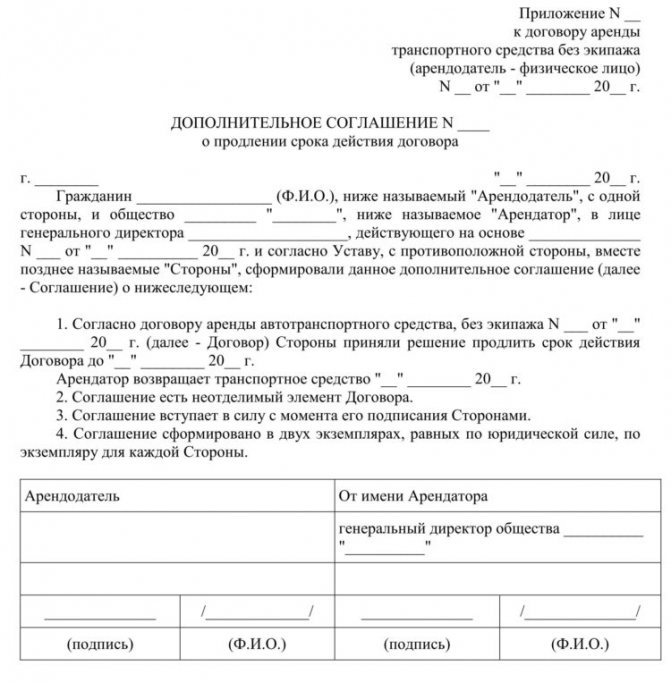Contract extension: what is it?
Contract extension – extension of its validity period.
REFERENCE!
Clause 1 Art. 420 of the Civil Code of the Russian Federation (hereinafter referred to as the Civil Code of the Russian Federation) gives the following concept of an agreement: “An agreement is an agreement of two or more persons on the establishment, modification or termination of civil rights and obligations.”
The duration of the contract is considered an essential term of the contract. The extension of its validity period is carried out in the case when the parties decide to continue cooperation.
You can apply for an extension:
- by including a prolongation clause in the main contract;
- by drawing up an additional agreement.
What does “contract extension” mean?
The word “prolongation” has French roots and literally means “extension.” It immediately becomes clear that the extension of the contract is its extension, that is, the “extension” of its validity period.
For some contracts, the term clause is essential, that is, without this, it will not be considered concluded. For others, it is unimportant, but this does not mean that the document does not have an expiration date.
This period can be prescribed by law, and if the parties have not changed it (a clear effect of the principle of freedom of contract), then it will apply to their contractual relations.
The deadlines may not be indicated anywhere, and then the norm of paragraph 2 of Article 314 of the Civil Code on the moment of fulfillment of the obligation comes into force. It implies that you demand fulfillment of an obligation when you see fit. The counterparty fulfills it within a week from the moment of such a requirement, and at this point the agreement is terminated, unless otherwise provided.
But what if the deadlines are set, but you don’t plan to end the relationship? Solution: resort to this same prolongation. Although not every contract can be extended. And not every time you want to renew a contractual relationship, you need to take any action.
It is impossible to extend a contract, the term of which is essential. These include contracts within the framework of the contract system in government procurement, in accordance with Article 95 of the Federal Law on the Contract System. It is impossible to extend the lease agreement for state or municipal land, because it is concluded only based on the results of auctions, in accordance with paragraph 1 of the resolution of the Plenum of the Supreme Arbitration Court No. 73.
There are contracts that, at the end of their validity period, become extended automatically - by law. This is possible if neither you nor your counterparty have expressed a desire to terminate the contractual relationship. This could be one of the following situations:
- rent of non-residential premises for a period not exceeding 11 months;
- trust management of property - if the owners have not made demands for redemption of investment shares;
- tour operator liability insurance. Mandatory condition: no refusal to renew within the last 3 months of the insurance contract validity period;
- energy supply (electricity, gas, water).
Paragraph 2 of Article 621 of the Civil Code says: if you live in rented housing and continue to do so after the expiration of the lease agreement, and your landlord does not object, then the document is considered renewed for an indefinite period.
This is somewhat different from a statutory extension. The fact is that the extension by law requires specific deadlines, namely those that were originally prescribed in the agreement. The renewal of the relationship between the tenant and the landlord does not imply any time limits.
Automatic renewal is a method of extending a contract that does not require your active action. However, in cases where such an extension is not provided, you will have to take certain measures to ensure that the desired contractual relationship continues.
Prolongation of a bank deposit
Prolongation of a deposit in a bank means increasing the term of an existing deposit after the end of the time period established for it. Typically, the extension is carried out for the same period as when opening the deposit.
You can apply for an extension:
- by contacting a specialist at the bank office;
- Some banks have the opportunity to apply for an extension in your personal account (online);
- without taking any action during automatic renewal (it is necessary to take into account that the interest on the deposit may change).
Automatic renewal
The term rollover is commonly used in banking and insurance circles. Prolongation (from Latin prolongare - to extend) - extension of the term of something .
Typically, insurance contracts, deposits and any other contractual relationships in the field of finance are extended. As a rule, the extension is carried out under similar conditions and for the same period.
However, in any case, you must study all the conditions yourself. Let's consider whether this is really convenient and how to increase your savings by prolonging your deposit.
A bank deposit is opened, of course, to make some profit. Money is placed in the account for a specific period and at a specific interest rate. These conditions are usually specified in the agreement for opening a deposit.
By placing a deposit , clients risk virtually nothing, because the majority of credit institutions are included in a special state program for deposit insurance. Under this program, an amount of 1,400,000 rubles is insured.
When the deposit term ends, the depositor has the right to decide to extend the deposit term at interest or close the agreement and withdraw all funds, including profit.
However, often when concluding an agreement, it stipulates the conditions for automatic renewal . In this case, the deposit is extended upon expiration without visiting a bank branch or concluding any additional agreements.

Loan extension
Prolongation (extension of the term) of a loan is a procedure that provides the borrower with the opportunity to increase the repayment period of a loan received from a bank or other financial organization if, for one reason or another, he is unable to repay it within the previously established period.
Usually not provided for in the initial loan agreement and is of a declarative nature.
Loan extension procedure
- The borrower applies to the bank or other financial institution that issued the loan with an application for the possibility of increasing the loan term.
- A bank or other financial organization makes a decision at its own discretion.
- If the answer is positive, an additional agreement is drawn up and signed.
REFERENCE!
For the borrower, prolongation of the loan agreement is a forced and economically unprofitable measure, since it forces him to pay interest on the loan over a longer period of time.
If a positive decision is made, the credit institution may increase the interest rate for the use of funds.
But with all this, both the borrower and the credit institution take away positive aspects from the loan extension.
Advantages for the borrower:
- no penalties or fines;
- no need to contact other credit organizations in search of a source for debt repayment;
- undamaged credit history.
Advantages for the lender:
- a large amount of interest received;
- absence of litigation and other actions to collect overdue debt.
Is it necessary to extend the residential lease agreement?
In order to correctly answer this question, it is necessary to understand its legal component. In accordance with Art. 606 of the Civil Code of the Russian Federation: “Under a lease agreement (property lease), the lessor (lessor) undertakes to provide the lessee (tenant) with property for a fee for temporary possession and use or for temporary use.” Art. 671 of the Civil Code of the Russian Federation determines that in the case of a lease agreement, a legal entity acts as the tenant (tenant), but if the tenant (tenant) is an individual, then we are talking about a rental agreement.
IMPORTANT!
The term of the agreement is mandatory when concluding a lease agreement. If it is not registered, then on the basis of clause 1 of Art. 683 of the Civil Code of the Russian Federation is considered equal to 5 years.
Russian legislation provides for mandatory registration in the unified state register of real estate of the Russian Federation (Rosreestr) of a lease agreement concluded for one year or more (clause 2 of Article 651 of the Civil Code of the Russian Federation). A landlord who evades registration with Rosreestr violates the law and may be subject to administrative liability.
Returning to the initial question about the need to prolong the rental agreement for residential premises, we can summarize the following. If you do not plan to officially register such an agreement, it should be concluded for a period of less than one year (at least for one day) and you should not add a prolongation clause to the document. If there is a need to extend the lease (hire) for a longer time, enter into a new contract.
What you need to know about automatic contract renewal
As a rule, an automatic extension is considered to be an automatic extension of the term of a contract due to its terms, without signing an additional agreement.
The contract can establish a prolongation that occurs upon notice, or a prolongation that does not require any action from the parties. As a rule, the parties independently determine the extension period. This may be a specific or indefinite period. The contract can be renewed one-time or an unlimited number of times.
If the extension clause is not observed, the contract may continue when the party wanted to end the relationship, or not last when the party wanted to continue it.
It is not prohibited to establish an extension in a foreign economic agreement.
What is meant by automatic contract renewal?
In practice, automatic prolongation can be understood as:
— automatic extension of the contract due to its terms, without signing an additional agreement;
— automatic extension of the contract by force of law. This applies, for example, to contracts for electricity supply, leases, and trust management of property <*>.
Most often, we are talking about automatic prolongation if there is an appropriate condition in the contract. It is advisable to include such a condition in contracts that involve long-term cooperation. For example, a framework supply agreement, an agreement on the organization of transportation.
The presence of a prolongation clause will allow the lawyer not to waste time on constantly monitoring the validity of contracts and signing the corresponding additional agreements.
At the same time, it makes no sense to include a clause on automatic prolongation in a contract with a one-time execution. For example, a one-time purchase and sale agreement, exchange.
If the extension of the contract is established by law, then for convenience this provision can be duplicated in the contract. But it is not necessary to do this, because... the legal norm will be applied in any case <*>.
Note : As a rule, the condition of automatic extension concerns only the term of the contract and does not apply to the period of fulfillment of a certain obligation. Thus, extending the deadline for fulfilling an obligation may have its own characteristics. For example, the terms of construction of a facility established in a construction contract can be extended only upon receipt of approval from certain government agencies <*>.
How to agree on a prolongation clause in a contract
If this condition is agreed upon, the following options are possible:
1) extension occurs by default and does not require any action from the parties. Upon expiration, the contract is automatically renewed.
Typically, this condition is supplemented with cases where the extension will not occur. For example, one of the parties will notify the other party of its unwillingness to renew the contract. It is advisable to specify the period of such notice in the contract. This will allow the parties to understand in advance the intentions of the counterparty as to whether the relationship will continue;
Examples of the wording of a condition in an agreement: “The agreement is automatically renewed for each subsequent year, unless at least one of the parties notifies of its termination no later than 10 days before the expiration of the agreement”; “The contract is automatically renewed for each subsequent year unless either party notifies the other of termination of the contract. Such notification must be made no later than 10 days before the expiration of the contract."
2) extension occurs upon notification. Here it can be provided that such notice must be sent by one of the parties or both parties.
Examples of the wording of a condition in a contract: “The contract is extended for each subsequent year, if no later than one month before the end of its validity period, the buyer notifies the supplier in writing about the extension of the contract”; “The agreement is extended for each subsequent year if the parties notify each other of its extension no later than 10 calendar days before its expiration.”
In practice, the question may arise as to what moment is considered proper notification: the moment the corresponding letter is sent or the moment it is received? In order to avoid disagreements, this nuance can also be reflected in the contract.
Examples of the wording of a condition in an agreement: “Notification is considered completed on the day the corresponding letter is delivered to the postal operator”; “Notification is considered complete on the day it is received by the addressee.”
It is advisable to send notice of termination or extension of the contract by registered mail with return notification and a list of the contents. This will allow you to confirm the date and fact of its sending.
How to correctly indicate the extension period
Most often, the parties can independently determine the period for which the contract will be extended <*>.
Note! For certain types of contracts, the law sets a deadline for their validity. For example, for a trust management agreement - 5 years <*>. The extension period specified in the contract must not exceed the maximum validity period established by law <*>.
You can specify an extension in the contract <*>:
1) for an indefinite period;
An example of the wording of a condition in an agreement: “The agreement is extended for an indefinite period if neither party notifies the other of the termination of the agreement no later than 15 calendar days before its expiration”;
2) specific period.
Here it is important to determine whether the contract will be renewed once for a specified period or an unlimited number of times for this period. It is necessary to stipulate such a prolongation condition in the contract as clearly as possible.
Examples of the wording of a condition in an agreement: “If none of the Parties to the agreement declares its intention to terminate it no later than a month before its expiration, the term of the agreement is extended for the next year, after which the agreement is terminated”; “The Agreement is valid until 12/31/2021 inclusive and is extended for each subsequent year unless either Party declares its intention to terminate the Agreement no later than a month before its expiration. This rule continues to apply after the first renewal of the contract and can be applied an unlimited number of times.”
Clear and unambiguous wording will allow the parties to avoid disputes about the duration of the contract.
What does failure to comply with the extension condition entail?
The presence of a prolongation clause in the contract does not mean that you can completely forget about the duration of the contract. So, in practice the following situations may arise:
1) the party wanted to terminate the contract, but missed the deadline within which it was necessary to notify the other party about this. In this case, the contract will automatically be extended for a specified period and the party will have to fulfill its obligations under it;
Example The contract contains the following condition for its extension: “The contract is extended for each subsequent calendar year unless either party notifies the other of the termination of the contract no later than 15 calendar days before its expiration.” One of the parties notified the other party 5 calendar days before the expiration of the contract. Since the notice period was not met in this case, the contract will not terminate. It will be extended for 1 year.
2) the party wanted to extend the contractual relationship with the counterparty, but missed the deadline by which he needed to be notified about this. In this case, the contract will not be renewed in accordance with the extension clause. And its provisions will not apply to relations between the parties arising after the expiration of the contract.
Example The supply contract contains the following condition regarding its validity period and its extension: “The contract is valid until December 31, 2020 inclusive. The contract is extended for each subsequent year, if no later than one month before the end of its validity period, the buyer notifies the supplier in writing about the extension of the contract.” The buyer notified the supplier of its intention to extend the contract on December 15, 2020. After this, on January 10, 2021, the parties signed a specification for the delivery of a new batch of goods. Since the buyer violated the notice period, the contract was not renewed and expired on December 31, 2020. This means that the terms of the agreement do not apply to relations for the supply of goods that arose on 01/10/2021. The supply of a new batch of goods will only be subject to the conditions set out in the specification.
If the notice period is missed and both parties intend to continue the relationship, they can extend the contract by concluding an additional agreement to it. And if the contract has already expired by this time, then a new contract should be concluded.
How can you terminate a contract that contains a prolongation clause?
The agreement may contain a provision that its extension will not occur in the absence of appropriate notification from one of the parties. Then, if the party does not intend to renew the contract, it simply does not send the corresponding notice to the counterparty. In this case, the contract is terminated upon expiration.
The extension clause often contains a clause that the extension will not occur unless there is notice from one of the parties. In this case, the party who does not want to renew the contractual relationship simply needs to send a notice to the counterparty. The contract will terminate and will not be renewed. In this case, you should remember the notice periods established by the contract.
In other cases, including when the notice period for termination of the contract is missed, the contract can be terminated on general grounds in compliance with the requirements of Art. 420 GK:
- by agreement of the parties;
- unilaterally by court decision;
- by unilateral refusal to fulfill the contract.
Is it possible to establish an extension in a foreign economic agreement?
Belarusian legislation does not prohibit the provision of automatic extension in a foreign economic agreement <*>. It is advisable to include such a condition in contracts that involve long-term cooperation, for example, in a framework supply agreement.
The provision for automatic extension is convenient, including for foreign economic (foreign trade) agreements that are subject to registration. Under such agreements, the bank must be notified of the completion of all operations no later than 30 calendar days from the date of establishment of the fact of their completion <*>.
The completion of all operations is also evidenced by the expiration of the contract. In other words, after the agreement has expired, the resident must send a notification to the bank within 30 days that all operations under the agreement have been completed. An exception is the situation when a party actually fulfills a counter-obligation under the contract after the expiration of its validity <*>.
If a resident forgets to renew the agreement and misses the 30-day notification period to the bank, he may be brought to administrative responsibility <*>. If the contract contains a provision for automatic extension, the contract will be extended in the absence of objections from the parties; there will be no obligation to notify the bank within 30 days, as well as liability for its failure to fulfill it.
Note! The automatic extension clause usually concerns only the duration of the contract. Such a condition does not extend the period for fulfilling the obligation under the contract, much less the period for completing the foreign trade operation under it.
Read this material in ilex >>* *follow the link you will be taken to the paid content of the ilex service
When is an extension needed?
As described earlier, it is possible to prolong the following: deposit, loan, lease agreement. Accordingly, the need to extend a particular agreement is determined by its nature.
The bank deposit is extended in order to generate profit and additional income on existing savings. Rent of residential premises - if the rental object satisfies all the wishes of the tenant. The need to extend a loan agreement is usually associated with difficult life situations:
- sudden dismissal from work or loss of another source of income;
- long delay in payment of wages;
- other force majeure circumstances.
Conditions for granting extension
The extension of the contract in all its manifestations is the mutual desire of all parties, i.e. the contract cannot be extended unilaterally.
Accordingly, the terms of the extension must suit all parties, although they may differ from the original conditions. Thus, the extension of a deposit does not always occur while maintaining the original interest rate, rental agreement/lease of residential premises - the cost of rent, etc. The conditions for granting an extension of a loan agreement are influenced by many factors:
- borrower's credit history;
- availability of documents confirming the objective reasons for the inability to repay the debt;
- precedents of violation of essential terms of the contract earlier.
Contract extension
Let us consider the extension of the contract in more detail, since this procedure is very often used by individuals and legal entities.
The extension of the contract is implemented in several ways, which imply this extension with the help of specific legislative acts. To choose the most suitable method for prolonging the contract, it is necessary to take into account several points that were mandatory when concluding the contract. These points are based on the trust of the partner parties, as well as whether the information data will have to be constantly checked or double-checked.
The most important point in the concluded contract will be information about the validity period. For some agreements, the presence of this clause in the contract is mandatory and unconditional.
For example, if you take a contract, it has specific validity periods and can be extended only in rare cases. In other contracts, such time frames are not defined, for example, when concluding a purchase and sale agreement . Here, the temporary duration of the contract and the obligations of the parties play a big role. This agreement stipulates a specific period during which work should take place between the parties to this agreement.
Setting a time limit is also an important factor when the interaction between the parties occurs for the first time, and thus it is possible to identify and prevent bad faith on one of them. If something does not go as expected, or certain disagreements arise, the parties can terminate the contractual relationship without waiting for the end of its validity, provided that the contract stipulates the conditions for early termination of cooperation unilaterally.

When the contract expires, the parties can decide to extend it. Here it is necessary to conclude a new cooperation agreement or extend the previous one. It is worth noting that very often the parties forget about the duration of the contract and, accordingly, forget about the possibility of extension. Similar situations occur when several contracts are concluded.
It is worth noting that inattention in this case can be extremely expensive and lead to unpleasant situations, for example, one of the parties may stop fulfilling its own obligations because the terms of the contract have expired.
To avoid such troubles, it is necessary to promptly extend the terms of contracts. This can be done through:
- legal grounds;
- additional renewal agreements;
- in automatic mode (if this was provided for in advance);
- concluding a new agreement.
Sometimes it is extremely profitable to implement transactions with extension. When a legislative document is not characterized by the extension of the contract, the participants usually independently stipulate this clause. This is permitted in cases where the extension of the contract is not established by legal agreements. They usually indicate time intervals for a particular arrangement.
For example, the extension of a lease agreement for a specific territory in a forest owned by the state or municipality is permitted for a period not exceeding 49 years (Article 72 Forest Code of the Russian Federation).
It is worth saying right away that the definition of prolongation in the document may differ from the prolongation in fact. For example, the document states that the concluded agreement is valid from the date of its conclusion and is valid for one year. At the end of this time interval, provided that none of the participants report a refusal during the calendar month, the contract is automatically extended for another year. It turns out that the contract was extended automatically.

Pros and cons of prolongation of deposits
Deposits that provide for an extension of the validity period are quite convenient. To extend the deposit, there is no need to enter into a new agreement, wasting your time visiting the bank. This is, of course, a definite plus, but there are also a number of possible disadvantages:
- Inability to use income - if you do not have time or forgot to withdraw interest accrued during the period of using the deposit, it is automatically added to the total amount, and you will be able to receive your income only at the end of the next period (unless otherwise provided).
- Loss of part or almost all of the expected income (interest) - the extension does not always provide for the original rate (the conditions of a particular banking product may change, and for the worse).
If the deposit is closed before its expiration (early closure), the depositor has the right to withdraw only the principal amount, even if the funds have been in the bank for most of the agreed period.
IMPORTANT!
The depositor can withdraw the entire amount with accrued interest on the day the deposit expires. If the client does not express such a desire, the next day this right is lost.
What interest will be lost?
The purpose of any contribution is to make a profit. Therefore, it is important to know in which case a depositor may lose interest accrued on the deposit:
- loss of part of the interest - banks often change the conditions for their products, so the interest on a certain type of deposit may decrease, and if the contract is extended, the client will lose profitability;
- loss of almost all interest - at the time of expiration of the contract, the type of deposit chosen may cease to exist, in which case the bank transfers the money to the account “on demand”, and this is only 0.1%.
Registration of specific dates
Several accepted norms will help to correctly arrange the validity period of a contract with extension:
- The terms of the duration of the agreement are formed at the end of the document, one of the last sections.
- When an additional schedule is drawn up, its text must correspond to a full-fledged contractual act: first there is a preamble listing the participants and their personal information, then the contents of the act - the adjustments, clarifications, additions made are listed in detail, at the end - the moment the changes enter into force, signatures, requisites. The official extension of the contract in accordance with the Civil Code of the Russian Federation does not necessarily require a separate annex; if there are other amendments, they can all be included in one text.
- If the date of entry into force of the amendment does not coincide with the day of its signing, you should not forget to mention this in the text, indicating the real activation date.
It happens that it is difficult to determine the time limit, for example, a transaction is concluded, the completion of which depends on external reasons, including force majeure. To protect yourself in such cases, it is more convenient to construct a sentence with intent, implying the possibility of postponing the end of the relationship indefinitely. That is, for example, not “...valid until 01/01/2021”, but “the manufacturer undertakes to deliver the goods by 01/01/2021”. The same can be done with an agreement on regular payments.
As an example, it is convenient to consider a sample additional agreement on contract extension:

Of particular note is the renewal of a contract for the lease of a building or structure. According to the law, rentals intended for a period of more than a year are subject to registration through Rossreestr. But when real estate is registered for use for less than 1 year, such registration is not required. In this case, the agreement is allowed to continue further in the usual way. At the same time, any lease can be concluded for an indefinite period without specifying extreme intervals, and the parties will not lose anything from this. The fact is that in Russia it is enough to simply continue to use the rented property (with the consent of the lessor) for the agreement to be considered officially extended.
Types and profitability of deposits
There are different classifications of deposits. For example, one of the criteria is the placement period. So, the contribution could be:
- Fixed - placed for a specific period specified in the contract (usually 3.6 months or 1.3 years). To generate income, funds cannot be withdrawn during the entire period; if this condition is violated, the money is returned without charges or with a significantly reduced interest, usually at the level of a demand deposit.
- On demand - for such a deposit, the funds deposited are returned to the client upon his first request. The downside is the meager interest rate (usually no more than 0.1%).
Among the time deposits, in turn, the following are distinguished:
- savings - provide the highest interest rates, but there is a ban on replenishment and even partial withdrawal of amounts;
- accumulative – provision is made for replenishment throughout the entire term of the deposit;
- settlement (universal) – it is allowed to perform incoming and outgoing transactions.
The yield (interest rates) on deposits is individual and depends on a number of factors:
- conditions of the bank in which the deposit is planned;
- the amount of expected investments;
- duration of the deposit.
It is for this reason that the terms and conditions for each banking product usually indicate a range of values from and to.
Deposit extension
Banking organizations constantly receive many offers to open an account for storing money, where the most popular is the offer to open a personal deposit or deposit. Today, a huge number of different options are being implemented by which banks accept funds from their clients, including the extension of deposits. This procedure means that when the deposit period comes to an end, the deposit is not closed, but extended for a predetermined period.
But not all banking organizations agree to prolong the deposit, since this is unprofitable only for the simple reason that no one has the right to guess at what specific period the depositor will decide to withdraw his own money. It is this point that prevents the bank from putting this money into full circulation.
Deposit extension means that an existing deposit will be extended for a specific time.
This clause must be specified when concluding an agreement on opening a deposit, otherwise the banking organization will not have the right to dispose of these funds. When storing money for a long time, such manipulation is very beneficial and profitable.
By placing personal savings once, you can forget about them, but at the same time constantly receive interest or continue to accumulate the invested amount. In the end, the deposit will generate quite a lot of money that can be spent anywhere.
Extremely relevant in our time are the so-called children's deposits, which are constantly replenished. After a certain time (usually the child reaches adulthood), he receives a good financial start for the future, and can spend the accumulated savings on paying for education, buying a car, apartment, etc. From the moment the money is issued from the deposit, the banking organization no longer influences it.

Is it possible to refuse an extension?
Prolongation is not provided for all banking products, so certain types of deposits are opened only for one term, without providing for the possibility of extension. In this case, the account is closed and a new one is opened if desired. In addition, there are possible types of deposits that clearly specify the number of extensions.
Cases when a bank may refuse to extend a deposit:
- if, when signing the contract, the client himself refused this service;
- if the extension application is submitted not by the investor personally, but by his representative, who does not have a notarized power of attorney to perform such operations.
REFERENCE!
The depositor may, on his own initiative, refuse to prolong the deposit, but it is important to do this on the day the deposit expires.
Types of deposit extension
There are several types of deposit extension:
Independent
Prolongation in this form is characterized by the fact that you must renew the deposit yourself. You must constantly come to the bank a few days before the end of the deposit to sign an additional document. Of course, this is not always convenient and comfortable, since you will have to plan your own day so that you have time to come to the bank and spend time that could be spent on other needs.
But, on the other hand, this type of extension provides a chance to personally monitor the movement of your own funds, and also, if necessary, withdraw them. When the deposit expires, it is much easier to withdraw money than to write a paper about early termination of the deposit.
Based on this fact, self-extension is extremely beneficial for investors. The main disadvantage here is the constant presence at the bank for renewal. While this will not be extremely difficult for many people, it will be very difficult for disabled people, for example, and it will be most convenient for them to take advantage of the automatic extension.
Automatic
This type of deposit extension is a specific system where the client does not have to come to the bank. The concluded agreement provides for the fact that upon expiration of the agreement, its placement is repeated for exactly the same time period in accordance with the conditions agreed upon in advance.
Note that the banking organization in this case is trying to do everything in its power to prevent the depositor from withdrawing his own savings. For example, the client may not be informed that the deposit term is coming to an end.
In addition, you need to understand that banks are interested in prolonging deposits, so they can offer more favorable deposit conditions for regular customers, for example, by reducing the interest rate or offering bonuses on existing deposits.
Therefore, before agreeing to cooperate with any banking organization, it is necessary to thoroughly and thoroughly learn about the offer and possible pitfalls.” If the agreement does not contain clauses where it is stated that the bank has the right to use the invested money, then it is prohibited from performing any actions with these funds. In case of violation, the client has the full right to sue.
Procedure for registering a deposit extension
Prolongation occurs automatically upon expiration of the deposit term, if the client agreed to such an extension when opening the account.
If such a service is not provided, the depositor must come to the bank branch, write an application, submit the necessary documents and sign a new agreement.
Documents required to complete the application:
- passport;
- original contract.
What you should pay attention to when adding a clause on deposit extension:
- by order: automatic or declarative;
- conditions of refusal;
- the timing of future renewals;
- interest rate changes;
- permissible number of extensions.
Features of automatic deposit prolongation
Automatic extension of a deposit is quite convenient for both the depositor and the bank, as it saves time and reduces the bureaucratic component of the process.
But at the same time, automatic extension has specifics that must be taken into account:
- Commencement of validity – the new deposit validity period begins to count on the next day after the end of the previous one. This is important to know if you plan to withdraw funds from the bank.
- Interest rate – is formed based on the rates in force at the bank on the date of automatic extension. The interest rate for a specific type of deposit may change downwards during the period of validity of the initial agreement. Theoretically, the bank should notify depositors about changes occurring, but often this is done for show using SMS notifications or emails. The client does not always attach due importance to this or simply may not understand what is going on, and capitalization will already be calculated at the new percentage. In addition, there may be cases when, during the validity period of the deposit agreement, the type of deposit becomes archived, in other words, it is excluded from the current list of offered banking services. Then the bank has the right in accordance with Art. 842 of the Civil Code of the Russian Federation to extend the agreement on the terms of a demand deposit, providing the depositor with a minimum interest rate.
IMPORTANT!
Even if the agreement provides for automatic extension of the deposit, you must take the time to study the current interest conditions so as not to incur financial losses in the future.
- The validity period is specified in advance in the contract; if this clause is not specified, it is considered equal to the original term;
- interest for the new period - when calculating, the initial deposit amount with the income received is taken into account. Of course, provided that the funds were not withdrawn;
- number of extensions - individually provided for in each specific case, if not specified - unlimited number;
- Refusal from automatic prolongation is possible when closing the deposit.
Automatic extension of deposit
Automatic renewal - what is it? In simple terms, the deposit will be extended without the client’s application. That is, today the deposit expired, tomorrow the contract will be automatically extended for the same period. The investor does not need to take any action.

Many deposit programs are immediately accompanied by an automatic extension option, that is, this is an integral part of concluding an agreement
Automatic extension takes place if both parties have not expressed a desire to terminate the contractual relationship.
Many deposit programs are immediately accompanied by an automatic extension option, that is, this is an integral part of concluding an agreement. In other cases, if the program does not provide such an option, but the client needs it, then the parties enter into an additional agreement to the contract.
What is important to know about automatic renewal:
- it can be canceled if desired. Automatic extension of the deposit is not a mandatory condition of the agreement. If the client does not want to use it, he can safely withdraw his money after the deposit period has passed;
- can be performed as many times as desired, but some organizations set restrictions, for example, automatically extend the deadlines only 2 or 3 times;
- the contract is renewed for the same period;
- the rate may be changed if there are grounds for this. This action of the bank will be legal.
What happens to interest after automatic prolongation
If, according to the terms of the program, interest is paid to the client upon expiration of the deposit, then with automatic prolongation the situation may develop as follows:
- The client withdrew interest on the day the contract expired. In this case, the remaining principal amount on the account will be subject to rollover. In this case, the client can reduce the amount placed, but until the automatic renewal.
- The depositor does not withdraw the accrued interest, then it is capitalized, that is, added to the principal amount of the deposit. As a result, the amount placed will be larger and the profitability will increase.
There is only a day between the end date of the contract and the start of the extension. If you want to withdraw some of the funds, do so within a day.
If you want to withdraw part of the money and roll over part
According to the terms of the agreement, the borrower often cannot withdraw money from the deposit without losing interest. Exceptions are deposits with a minimum balance, before reaching which debit transactions can be carried out. But if the program does not provide a withdrawal option, then you can only withdraw the money in full by terminating the contract. Of course, investors are doing everything possible to prevent this, so they wait until the end of the placement period.
If you want to reduce the amount of a deposit to which automatic extension is connected, you need to contact the bank on the last day of the agreement and simply terminate it. Next, the client enters into a new agreement, that is, opens a new deposit for a smaller amount.
If you think about what extension is, you can understand that it is an automatic process. If the client does not apply, the system perceives this as consent to renew the contract and increases the deposit for the same period. A citizen may come to his senses and contact the bank, but he will have to terminate the contract. And termination means the loss of interest that was accrued after the extension.
If the deposit program ceases to exist
In such a situation, even if automatic renewal is activated, the deposit will cease to be valid, the money will be transferred to the “On Demand” deposit, for which a yield of 1% is usually assigned. The program no longer exists, so there is nothing to renew.
Banks usually report this fact by calling or SMS. If you find yourself in this situation, you can do the following:
- Come to the bank, study the current deposit programs and choose another placement option with similar options. Then the money is simply transferred from the account to the new deposit.
- Take money from this bank and put it in another. This is usually done if there are no interesting offers in the previous organization.
Monitor the status of your deposit account through online banking. If, at the end of the program, the contribution is transferred to the archive, you will see this in advance and will be able to take some action.
It also happens that investors hope for automatic extension, are not particularly interested in the state of the account, and after a few months they find out that there was no extension and that the program has ceased to exist. So, be interested in this. If you realize that the deposit period has come to an end, find out whether an automatic extension has been made.
If you missed the automatic renewal and want to cancel it
In this case, you need to break the contractual relationship with the bank. The amount of the new deposit after prolongation is the amount originally placed on the account plus accrued interest. In any case, you will not lose this money.
If the renewal deadline is missed, you come to the bank with your passport and simply close the deposit. Only interest that was accrued after the extension will be lost. If this is a short period of up to a month, the loss will not be significant. In the end, you take the money and use it as you wish.








